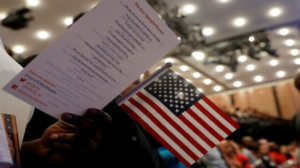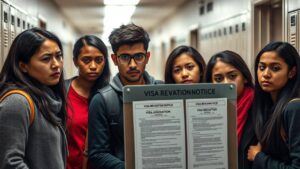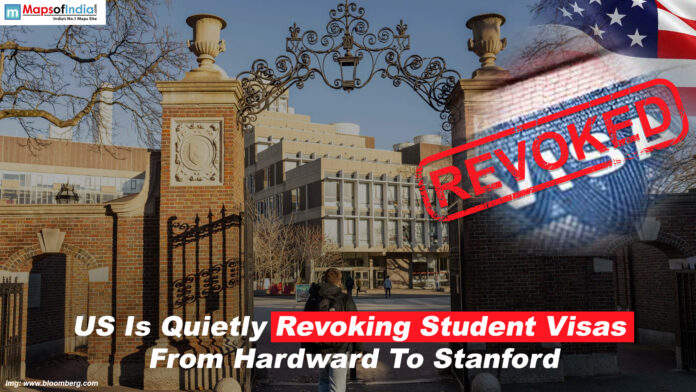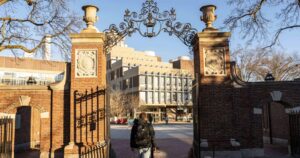US Is Quietly Revoking Student Visas From Harvard To Stanford
The US is quietly revoking student visas from Harvard and Stanford. This trend is about visa cancellation and has shocked the academic world. This sudden change has put many international students in a tough spot. Top American universities are dealing with unexpected visa cancellations. These cancellations can disrupt education, careers, and lives.
People have seen the U.S. as a leader in international education; however, this quiet policy change raises questions about that role. Students, universities, and immigration experts wonder why the US is quietly cutting student visas at schools like Harvard and Stanford.
What exactly is happening?
 Over the past years, many international students attending top universities—including Harvard, Stanford, MIT, and Yale- have faced unexpected visa cancellations. These revocations are constantly issued without warning, justification, or notice. Students who leave the country for short visits find themselves barred from returning. Others receive sudden emails or letters indicating their student visas have been canceled, despite being in good academic standing . In most instances, the reasons cited are vague and classified under “national security concerns” or “eligibility issues”. As a result, the US is quietly revoking student visas from Harvard to Stanford without a transparent process or clear communication.
Over the past years, many international students attending top universities—including Harvard, Stanford, MIT, and Yale- have faced unexpected visa cancellations. These revocations are constantly issued without warning, justification, or notice. Students who leave the country for short visits find themselves barred from returning. Others receive sudden emails or letters indicating their student visas have been canceled, despite being in good academic standing . In most instances, the reasons cited are vague and classified under “national security concerns” or “eligibility issues”. As a result, the US is quietly revoking student visas from Harvard to Stanford without a transparent process or clear communication.
University Sounds Alarm
The wave of student visa cancellations has not gone unnoticed by elite institutions; Harvard and Stanford have raised concerns. They want more transparency and due process. International student offices feel overwhelmed. They struggle to provide support and clarity. Decisions are often made behind closed doors.
University presidents and legal teams argue that these strict measures:
- Undermining academic freedom
- Put essential research collaboration at risk.
- Disrespect the students’ contributions to American society.
They want to talk to the U.S. government. They want to make sure that valid student visas aren’t taken away without a good reason or proof. But, as of now, we have made little progress—highlighting how unnoticed it has been .The US is quietly revoking student visas from Harvard to Stanford.
A Scheme of Highlighting STEM Individuals
The U.S. government is secretly working to cancel student visas. As a result, tensions in academia and beyond have increased. This worry is especially strong for students from China, Russia, and Iran. Yet, the broad nature of these revocations faces criticism. Some believe it harms innocent students. It also hurts America’s reputation in education and innovation. Silent Crackdown on STEM Scholars Federal agencies are quietly canceling visas for international students. They claim it’s for national security. This impacts students in areas like artificial intelligence, quantum computing, and aerospace engineering. Students receive sudden notices of visa termination. Often, there are no clear explanations or ways to appeal. A Stanford PhD candidate in robotics shared their experience of getting stranded abroad. Their visa was suddenly revoked while visiting family, which disrupted years of research. Harvard and UC Berkeley show similar trends. They don’t rely on actual proof of any wrongdoing. Administrators say that ignoring talented scholars hurts teamwork in research. This, in turn, makes the U.S. less competitive. More than 40% of STEM graduate students are from other countries. Many stay in the U.S. to help with tech and science advancements. Critics warn that by shutting them out, the U.S. pushes talent to rivals like Canada, Australia, and the EU. These countries are actively recruiting displaced students with easier visas and research funding.
The Department of Homeland Security says the crackdown is necessary. They want to guard against theft sponsored by other countries.
However, data show little evidence connecting most students to espionage. A 2023 report showed that less than 0.1% of international scholars faced charges for intellectual property violations. Yet, many have faced increased scrutiny. Advocacy groups, like the ACLU, claim that agencies engage in racial profiling. They point out that students of Chinese descent get more scrutiny. This happens even when they research non-sensitive topics.
Long-Term Consequences for Global Leadership The fallout extends beyond individual hardships. U.S. universities depend on international tuition. Now, they face financial strain because applications from abroad are dropping. Foreign firms and universities are taking advantage of the decline. They attract researchers by offering academic freedom and stable visas. “The U.S. is handing its rivals the tools that will enable them to surpass us in innovation,” warned a MIT dean in a recent editorial.
A Call for Balance: Experts want reforms.
These changes should protect national interests but also remain open. Proposals suggest clearer rules for “sensitive” research areas. They also call for transparent visa review processes and stronger legal protections for students. Without these measures, quietly revoking visas from Harvard to Stanford could disrupt lives. It may also weaken America’s role as a center for the world’s brightest minds.
As talks about security and academia grow, the U.S. must make a key choice. It can either hold on to suspicion or renew its commitment to global knowledge sharing. This exchange has fueled its scientific leadership for many years.
What can learners do now?
International students in the U.S. or planning to study there need to stay alert. Here’s what you can do:
- Maintained excellent academic and immigration records.
- Avoid unnecessary international travel.
- Consider postponing travel until the situation stabilizes.

This is important, especially if your visa needs renewal. Consult your international student office regularly. They may have the latest updates and can guide you through any changes.
Seek legal advice early. If you believe your visa is under review or if you’ve faced issues at entry points, contact an immigration attorney immediately.
Stay informed through reliable channels. Use official sources like the U.S. Department of State, your university, or reputable immigration news services.
Remember, you are not alone. Students and universities are joining forces to fight unfair actions. The US is revoking student visas from Harvard and Stanford without drawing attention.
Closing Insights: A Challenge to Act
The US is quietly revoking student visas from Harvard to Stanford. This isn’t just an immigration issue. It’s also about academic freedom, global cooperation, and human dignity.
International students come to the U.S. to learn, contribute, and grow. They enrich American campuses and communities with their cultures, ideas, and dreams. Denying them this chance is unfair. It goes against the values of American education.
Policymakers, universities, and students must unite. They need to ask for a better system. This system should welcome talent.





